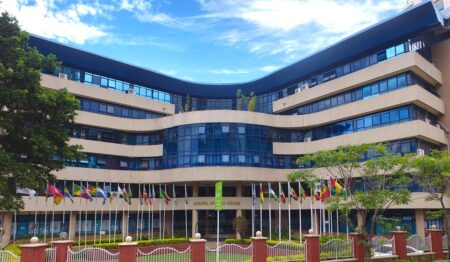Technological advancements, financial sector innovations and recent health threats like the Coronavirus have fuelled a greater reliance and need for digital trade and online shopping. The surge in E-Commerce globally has resulted in the need for efficient payment and data management systems. The adoption of data centres provides a data management system solution that allows for efficient payment across e-commerce platforms.

What are data centres?
Data centres are ICT command centres used by various businesses to provide cloud storage, data processing and applications support services. These are useful to ensure safe, efficient and reliable online markets.
IT penetration in Africa is the major determinant of the growth and development of data centres. Economic and administrative prioritisation has not been directed towards investments in IT infrastructure. A norm that IT investments are concerns for the private sector and not for the government prevails throughout the continent. As such, the continent is falling behind in IT penetration as government efforts lag behind that of the private sector. Infrastructure development in IT by the private sector has hugely promoted e-commerce.
With the growth of digital business, there has been a wave by organisations to develop data centres to better handle the digital sphere of doing business. Most of these data centres have been adopted in Africa’s biggest markets, like Nigeria and South Africa. This sophisticated avenue of ICT is an emerging employment sector.
A competent labour force with adequate skills is required to ensure efficient management of data centres.
Investment in ICT infrastructure
Global growth and advancements in IT infrastructure and systems have fuelled a surge in online business. Growth in e-commerce of 40 per cent is expected across the African continent, accompanied by the development of supporting ICT services.
Various foreign players have invested hugely in e-commerce, in Africa. Tiger Global Management and Rocket Internet both invested over 3 billion Rands in South Africa and Nigeria respectively. Continued foreign currency injections in the continent will capacitate economies in ensuring sustained and substantial growth. These will also help the continent to be globally digitally competitive.
Reduced barriers to entry for SMEs
Some data centres are managed by third parties and open to public use and interface. Global online shopping markets such as Amazon and Alibaba have paved the way for the African continent to have a global reach. They have also allowed small businesses to partake in global business and provide diversity and product variety.
Huge capital commitments that were required, as well as the lack of information relating to international markets, has in the past drawn back the progress of SMEs. Both, big established businesses and small startups are enjoying the benefits of a broader online market that reaches beyond geographical constraints. Nigeria is recognized for pioneering the most common IT startups on the continent; Jumia, Konga and Mall for Africa.
Efficient Payment and Financial Platforms
Efficient financial platforms have been developed to promote real-time and borderless business. They are convenient, for processing huge data and information flow in a cost-effective and timeous manner.
Kenya is considered a maestro in developing the most user friendly and reliable online payment solutions, on the continent. The Silicon Savannah IT ecosystem in Kenya gave rise to the development of the M-Pesa mobile money which revolutionized the entire economy.
Greater financial inclusion was achieved, reduced transaction costs, convenience and real-time processing of payments contributed to increased business activity. Africa’s trade is mostly dominated by the informal economy and thus gains in this sector have been marginalized, for the overall success of the economy.
A revolutionary mobile payment solution paved the way for the inclusion of this lucrative economic sector. The system allows for financial institutions to have a point of reference for providing credit lines to this sector.

Investment in energy critical for powering data centres
Huge data management systems thrive on the availability of substantial energy supplies. The energy demand for these centres far outstrips the capacity the continent has. Existing infrastructure development in energy is falling behind the growth of data centres and high energy demand communication networks.
An IT giant, Flexenclosure, introduced off grid-based eData centres and eSite hybrid stations in Ethiopia. These ensure less energy use, greener energy solutions and uninterrupted cloud-based systems to the business environment.
E-Commerce business is done 24/7; payments are done in real-time and a lot of data traffic passes, thus calling for efficient and reliable energy systems. In South Africa, internet traffic is expected to grow immensely by 2021 giving rise to more data centres and IT technologies.
A higher burden will be placed on the national grid. This can give rise to higher demand for clean energy solutions – a positive cause and effect outcome of E-Commerce. By promoting energy business using E-Commerce platforms and improving E-Commerce platforms with cost-effective and reliable energy solutions, both sectors can grow significantly.
The risk of Cybercrime
Online business is efficient, easily penetrable and a high demand market. Great concerns have arisen over the security of information and threats to such security violations. Referred to as cybercrime, these malicious cyber activities are a threat to the efficiency of E-Commerce in Africa.
Much is yet to be done towards developing a secure cyberspace to safeguard the rapidly increasing online market. A notable example is the Pegasus malware which was discovered to have infected systems in 11 African countries.
Of the most financially included population in Africa, familiarity with cyberspace threats is minimal. This creates a large pool of vulnerable participants in E-Commerce. The lack of adoption of efficient cybersecurity systems also affects large corporations, with substantial losses capable of crumbling an entire economy.
Financial institutions as well as mobile money service providers are the most at risk to cybersecurity breaches. Between 2017 and 2019 Uganda, Kenya and Rwanda lost millions to cyber-attacks which mainly targeted financial institutions. Kenya Equity Bank is a notable case scenario to such.

Data centres fuel E-commerce trade
The continent in its efforts to become a global hub of trade seemingly is sailing on the correct path. Increased innovations, investments and development in IT are contributing significantly and positively to economic growth and development on the continent. More employment opportunities are being created.
Increased global participation is facilitating the integration of socio-cultural beliefs and values for a more unified world. Though challenges in cyberspace security exist, much of the impact of data centres is in building an economically resilient and dominant African continent.
Read also: Testing Data Centre Demand in Africa











